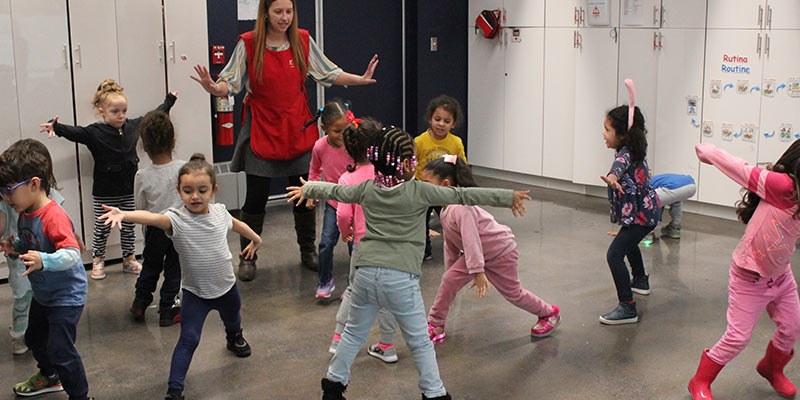
"You’re Not Going to Find a Better Community" - A Mom's Experience With IBA's Preschool
In our second interview with the parents of our preschoolers, we spoke to Catherine, the mother of 3-year-old Louis. After they to Boston from Chicago a year ago, she enrolled her son in IBA's Preschool to immerse him in a more diverse community.
Q: What do you think the benefits of the multicultural preschool can be?
Catherine: It’s shaping my child’s world in a way that I can’t give him on my own. We do have some multiculturalism in our [family’s] friend group, but you only have the people that you know, so it’s tough to break into other groups. The way that we (my husband and I) found that we can do that is through our kids. So we’ve made friends through our kids’ friends. It’s important that we’re giving our preschool-aged children a diverse experience. Socio-emotional aspects of a person's development are most important during the preschool years, so understanding at an early time that there are people completely different than yourself is paramount. We are focused, even more than academics, on making sure that our kids have a diverse experience.
And of course, the language part of it is amazing. There’s the concept of synaptic pruning, so when you’re a child there’s all sorts of neurological connections that are made from birth. Basically, picture a big tree, lots of branches, in your brain and when you start to learn and develop more, some of the branches get cut off. Some weaken away, and others get stronger depending on what you’re exposed to. So a baby, when they’re first born, has unlimited possibility with developing language. Once those little neurological connections disappear however, you can never get them again. For example, I’ll never properly be able to speak Chinese, because I can’t make the sounds. I’m hoping that by exposing my child Monday through Friday, 8 to 6, to Spanish, he’ll have a better shot at sounding competent in Spanish than I did, just learning from high school.
Q: How’d you hear about IBA’s preschool?
Catherine: We moved here in the summer, so I was exploring the different options around where we live because I think it’s important to have the kids close to home, and also to foster community. We wanted to be near to the people they’re going to school with everyday, they can do playdates after school and maybe [my husband and I] can make some friends! So we looked at other preschools, and there were other seemingly multicultural options around here, and I’m not an expert in Spanish or anything, but they didn’t seem like the real deal, and IBA is the real deal. Everybody is definitely bilingual, seemingly from birth, every teacher here is completely fluent and a native speaker in their language. Some of the more expensive daycares, by the way, don’t offer that. Their Spanish aspect is more of a special, or a side feature, rather than the primary language spoken in the classroom, and I don’t think that’s as beneficial.
The other aspect of IBA I appreciate, and wanted, is that they offer a sliding scale tuition. So that exposes my child, as a child that comes from a family that is able to pay the full tuition, to different socio-economic backgrounds, so he knows what the real world is, as opposed to just his socio-economic level, which is very important. Here, they make their own food, and it’s a palate that I would have to learn how to make. So I like that he’s exposed to so many types of cuisine, which is also very helpful for a full time working parent.
Q: What is your favorite part about the preschool?
Catherine: The teachers. They are above and beyond, such nurturing individuals. They’re organized and thoughtful, they have good communication. There’s an app that they use to send pictures, show what your kid’s up to, and he loves them. He talks about them at night before he goes to bed! He’ll say, “I love you Mommy, I love you Daddy. I love Miss Valerie, I love Miss Zenaida, Miss Elizabeth.” So you know going in, that your kid is loved and taken care of.
Q: What impact has IBA had on your child? Have you seen any improvements?
Catherine: He does speak and understand Spanish, and it’s been very quick, we haven’t even been here a full year yet. He’s able to follow instructions, and talk to his teachers in Spanish. He doesn’t talk to me in Spanish yet because he says I’m silly when I talk to him in Spanish, so we still speak in English at home. He actually has better language skills than my older child, who wasn’t exposed to another language so early on. It might just be him, or that he was exposed to a different language that helped him develop better skills. I would also say generally he has progressed well, he shares, he gets along with children very well. He’s 3, so he has his own struggles but it’s nothing atypical of the age group. The best thing though, is that he’s happy going to school every day. It’s tough to see because we’ve never had another preschool experience with him, but he’s definitely met and surpassed all developmental milestones since starting at IBA.
Q: Would you recommend the program to other parents?
Catherine: Absolutely. You’re not going to find a better community, you’re not going to find more loving teachers, better nutrition during the day. Our child has a food allergy and they’re very cognizant of that and make special accommodations for him. The school’s cognizant of individual families on a financial basis as well. There’s no preference if you are able to pay full or partial tuition, so they get a nice mix of incomes.
To learn more about IBA’s preschool, visit http://ibaboston.org/preschool
...